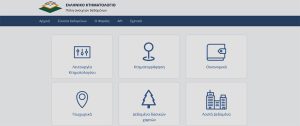The Hellenic Land Registry designed and created an open data portal (https://data.ktimatologio.gr) and will soon provide the first data sets starting from the monthly budget execution until its daily operation
“This is just the beginning,” said Michalis Vafopoulos, a board member of the Hellenic Land Registry, who is in charge of digital transformation. “We believe in the enrichment of its content through co-creation, ie the proposals and the active participation of directly interested professionals and citizens.”
The Hellenic Land Registry produces a number of open data which are accessible to anyone interested, having given priority to data whose open availability can have added value for public administration, society, the scientific community and the market. It is a strategic decision of the Land Registry to continuously enrich the relevant list of data to further enhance the transparency and digital transformation of the country.
 What is open data
What is open data
Open data is data that is accessible via the Internet to all and for which there are no technological, legal or other restrictions on their access and use with certain exceptions. For example, restrictions related to “non-commercial use” or restrictions on use for specific purposes only (eg only in education) are not permissible in the context of the open availability of data and make this data yes reusable, but not open.
An important subcategory of open data is open government data and includes data published by government agencies.
Open government data should be governed by ten basic principles:
- Completeness
- Primary source data
- Timeliness
- Ease of physical and electronic access
- Machine readable
- Accessible without discrimination
- Use of open templates
- With open license
- In the same place forever
- With minimal usage costs
Data as the core of the Single Digital Market
The promotion of big data technologies and the availability of more and more open data are a top horizontal European priority with vertical projections in science, business, everyday life and governance. The construction of the European Open Data Portal is complemented by a series of funded actions and policies to deepen the use of data as a catalyst for digital transformation. All EU Member States and other developed countries as well as international organizations are moving in a similar direction.
The contribution of Open Data to Development
The availability of open data is an important part of the overall data utilization policy because it creates high added value in a large part of the social and economic development. The source of their added value comes from improving the transparency of public decisions, efficiency in the use of resources and ultimately the creation of new opportunities for entrepreneurship.
Where is Greece located and where does it aspire to reach?
Recently, Greece in the digital economy and society index DESI for 2021 scored 85% in open data while the EU is at 78%. However, the bet for the future is to formulate a national strategy for open data in cooperation with non-governmental organizations which will homogenize the disseminated data, ensure compliance with international quality standards and give priority to high value data sets aimed at addressing central economic, social and political problems
The Open Technologies Organization
The Open Technologies Organization (EELLAK) is a non-profit organization created in 2008 by universities, research institutes and non-profit organizations and today has 37 academic and research bodies members. Its purpose is to promote openness, ie open source software, open source content, open source software, open government and open data in public administration, education and business.
The Open Government Partnership
The Open Government Partnership (OGP) is a global multilateral government and civil society initiative aimed at making governance more transparent, participatory and accountable. 78 governments and hundreds of civil society actors from around the world are participating. Its focus is on equal cooperation between government agencies, citizens and organizations with the aim of formulating interventions that increase access to information, participation and accountability.
Two examples of open data utilization
A prime example of public data leveraging is the London-based media operator, which has over 200 types of open data based on which 12,000 registered software engineers have developed 600 applications generating an annual profit of 11 116 million.
Also, the School Atlas of London, depicts all the schools with their performance and through a series of smart functions is the tool for choosing a school and a place of residence of a family.
The School Atlas of London utilizes open data and is a tool for choosing a school and a family’s place of residence.
Source:michanikos.gr